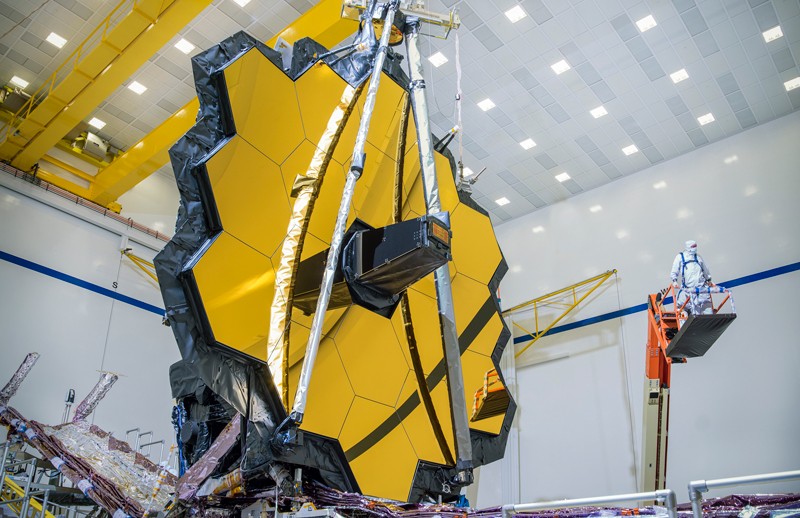While you were sleeping or staying up searching for the certificates of men angling to be your president, a changing moment in human history happened. It was just how a similar thing occurred some two thousand years ago when a baby was born in Bethlehem, and nobody in your hometown knew about it. Nobody took a selfie with the baby and posted it on social media. Not even the three wise men that visited him from the East bothered to do so.
Thanks to Webb Space Telescope, we may soon see the picture of that moment and the picture of every other moment that is important in human history. We may soon see the video clip of Jesus feeding 5000 people with five loaves and two fish. We may also see the video clip of Gabriel visiting 40-year-old Muhammad in the Hira cave. We may soon see video clips of bald Gautama Buddha in Nepal as he teaches and works to achieve Nirvana, freedom from ignorance, craving, rebirth, and suffering.
You need nobody to tell you that we are far away from the days of a pinhole camera. It does not matter how remote a place you are in the world; you may have in your hand a phone that contains more information than all the top-secret information that President Bill Clinton had access to when he was at the White House in the early 90s.
You can understand why when the first set of images from the $10 billion Webb Space Telescope arrived, it was so important that NASA had to go to the White House to reveal them. After all, if there is anything President Joe Biden knows, it is that he knows what a f…ing big deal is when he sees one.
Advertisement
The great reveal of images from the most powerful telescope ever launched into space was streamed live on NASA’s website for everyone in the world to see. That you did not know about it or did not watch it did not diminish the importance of the day.
“Webb can see backwards in time just after the big bang by looking for galaxies that are so far away, the light has taken many billions of years to get from those galaxies to ourselves,’ said Jonathan Gardner, Webb deputy senior project scientist at NASA.
Launched in December, the telescope is traveling in a part of space one million miles away from the earth. It uses advanced infrared technology to capture images that mankind had never seen. Its mission was to capture the first stars and galaxies of our universe.
Advertisement
NASA Administrator, Bill Nelson, said this about the images: “It is the deepest image of our universe that has ever been taken.” The telescope captures images of galaxy clusters as they appeared some 4.6 billion years ago.” Mind you, the Big Bang took place some 13.8 billion years ago.
Webb program scientist and NASA Astrophysics Division chief Eric Smith wrote, “The world is about to be new again.”
In High School integrated science, I was mesmerized when I read about the pinhole camera’s magic. I soon heard about the dream of scientists to invent what could travel faster than the speed of light. Their goal is to use the machine to capture the sun’s rays that hit the earth years ago while it travels in space. The idea is that this light carries along as it travels in space images of what was happening when the rays touched the earth. The pinhole camera later became the science behind video imaging.
For a long time, the problem was that scientists could not build something that traveled faster than light. Such a machine could head far into space and block the light that came on earth when Jesus was here or the more recent ones that were on earth when Muhammad was here. Fascinating stuff. And once they capture these lights, they can use photographic tools to retrieve the images and the videos. That is when they will verify the stories about these religious leaders.
Advertisement
Not long ago, breaking the speed of sound was as daunting as breaking the speed of light is today. But on October 14, 1947, US Air Force pilot Captain Chuck Yeager became the first person to break the sound barrier. He traveled faster than the speed of sound. When he did that, his aircraft flew above those watching, and a minute later, they heard the sound of the jet’s engine. It is the same phenomenon that we observe when lightning and thunder strike. Though the two happen at once, we see the lightning first before we hear the thunder because light travels faster than sound.
Because there is no air in space, sound does not travel in space. On earth, sound travels as vibration along the particles of the medium in which it travels. As it travels away from the source, it spreads and loses energy, which is converted into heat. Its intensity reduces until it dissipates entirely. If it were not for that, if we travel faster than the speed of sound, we could capture the sound made years back.
In the case of light, the opposite is the case. Light travels through space, and because it is another form of energy that cannot be destroyed, it travels infinitely unless or until it is stopped. Light travels at 300,000,000 meters (186,000 miles) per second in a vacuum. The speed of sound, in comparison, is only 342 meters per second or about 761 miles per hour or 1225 km per hour.
The closest humans have made to create a mechanism that travels close to the speed of light was at the Large Hadron Collider in Geneva, Switzerland. The European Organization for Nuclear Research (CERN) built the $10 billion collider where 10,000 scientists in hundreds of universities from more than 100 countries are exploring different theories of practical physics. Since 2010 when it went into operation, it has been able to measure the Higgs boson, subject the Standard Model to test, and study the nature of dark matter that constitutes over 27% of the universe. It also verified the so-called god particle. In the experiments conducted at the site, there were fears that the particle collider smashing particles near the speed of light might produce a black hole that would swallow everything on earth.
Advertisement
Albert Einstein, in his special theory of relativity, argued that no object could travel faster than the speed of light. Recently, Erik Lentz at the University of Gottingen came up with a way to circumvent the cosmic speed limits of Einstein’s theory. Though Lentz’s proposal is not practical at the moment due to the massive amount of energy needed, it places on the table how to arrange the structure of space-time to bend it. That way, a spacecraft could arrive at a destination faster than light by contracting space in front and expanding space behind in what is known as a “warp bubble.”
“This work has moved the problem of faster-than-light travel one step away from theoretical research in fundamental physics and closer to engineering,” Lentz said in the face of the enormous hurdles that building his wrap drive face.
Advertisement
While Lentz is not giving up on ways to get around the challenges, the Webb Telescope that can capture the image of the universe some 4.6 billion years ago has gone too far in the possibilities of shaking the table about facts and fiction about our contemporary history. Webb Telescope scientists can scale it back to just capturing the light, images, and videos of what happened some 2000 years ago.
The day Webb does that, and NASA has the images to show Jesus raising Lazarus from the dead and Buddha’s disciples sharing his ashes after cremation, you can bet that on that day, the world will stand still.
Advertisement
At this point, it is not about if but when. Ready or not, that day is on the horizon.
Advertisement
Views expressed by contributors are strictly personal and not of TheCable.







